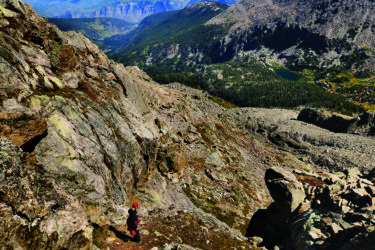The Local newsletter is your free, daily guide to life in Colorado. For locals, by locals.
During the summer of 2016, Alyson Kirk started having recurring nightmares. She and her husband, John, were on a mission to ascend every peak of at least 12,000 feet in Colorado, and Turret Ridge near Ridgway, known as the state’s most difficult “twelver,” loomed next on the list. “It’s a mass of decomposing volcanic tuff where every handhold is subject to coming out,” Alyson says. But while the prospect of scaling a mountain that only two to three people summit every year haunted her dreams, she believed reaching its pinnacle would help her and John keep a much more important commitment.
John, 43, and Alyson, 36, began struggling with alcohol addiction when they were teenagers: Alyson was raised by alcoholic parents, while John built his high school identity around getting drunk. Both got sober during their 20s, and before meeting, each started exploring the Colorado wilderness because the disconnection from daily life made it easier to forget about booze. Mutual friends introduced the pair in 2011 on a hike, sparking a romance centered on bagging peaks instead of ordering rounds.
The Morrison couple first ascended the 1,000 tallest mountains in Colorado and—after getting married atop Ulysses S. Grant Peak near Telluride in 2012—turned toward ever-more-challenging goals. By 2017, they’d conquered every 12,000-foot-plus mountain in the Centennial State, and they are in the midst of scaling every twelver or higher in the Lower 48. They’ll likely finish summiting every peak of at least 10,000 feet in Colorado by early next year. “Both of us are really hardwired to be super obsessive,” John says, “so redirecting that addictive personality to the outdoors is a good thing.”
While it might seem as if the Kirks are trading one addiction for another, Christian Hopfer, a substance abuse expert at the University of Colorado Anschutz Medical Campus, says it’s good they’ve found healthy habits to replace time spent drinking. “When people quit using [drugs or alcohol], they often find they have a lot of time on their hands,” Hopfer says. “You have to fill it doing something else, and it has to be rewarding.”
For the past eight years, the Kirks’ calendar has been plenty full: On weekdays, they’re at their jobs—Alyson owns Alpine Air, which prepares used cars for resale, and John works in finance—but they spend much of their spare time mapping their next routes. Come the weekend, they’re often off to a trailhead or Denver International Airport for an evening flight that gives them enough time to reach a far-off locale, sleep, and then rise and climb. During the summer and early fall, this unrelenting regimen allows them to summit as many as 11 peaks per day—a remarkable tally that’s about much more than bragging rights.









